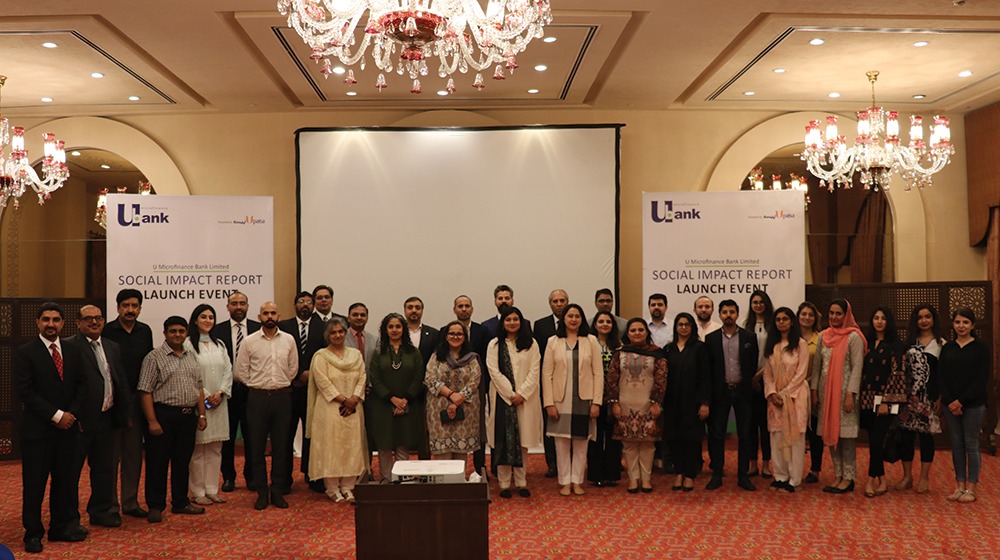ISLAMABAD, Pakistan: U Microfinance Bank launched its flagship Impact Measurement & Baseline report in an event hosted in Islamabad on Monday.
The guests included executives from various microfinance, research and international institutions who all came together to discuss the challenges and opportunities in measuring social impact within the Pakistani microfinance sector. This first-of-its-kind report in the Pakistani ecosystem, is a concrete step forward by U Bank to gather and open-up more customer side data and insights and ensure better product and service design with the aim of improving the sectors social impact outcomes.
The report comes at an opportune time when the global microfinance industry is grappling with the key question of its ability to deliver on its dual promise of social and economic performance. While recent research has put the core assumption of the sector, that it lifts people out of poverty, under increasing scrutiny with evidence contrary to that belief remains in agreement that it is still a major part of the equation.
The report looks at data across five main categories of impact – household, livelihood, health and nutrition, business and the bank’s product and service quality. The first report, which will be a biennial effort, establishes a baseline of where U Bank’s customers are currently against these metrics and analyzes their perceptions about the impact that the microfinance loans have had on their lives and livelihood. The methodology used is a blended approach – combining elements of experimental and Acumen’s lean data approaches – to put forth a new way of measuring impact from the costly and time and labor intensive RCTs that have been traditionally been favored to assess impact. In line with global research, our data shows that microfinance plays a key role in helping our customers overcome shocks such as illness, death, crop failures and natural disasters. Furthermore, one of the biggest values our customer attribute towards the loan is the resulting gains in quality of life and how it helps smooth household consumption. 75% of the respondents indicated that the loan has led to a positive impact on their business income and a majority of them agreed that the loan was critical for the health and quality of their businesses. The report also digs deeper into the data-set and combines it with qualitative information collected via focus group, to provide a fresh and in-depth analysis of microfinance customers and pulls out some very interesting insights.
For instance new analysis from the report shows that:
- While 90% of the respondents saved a portion of their income, only 3% of them save formally. Furthermore, contrary to previous research which indicates that women borrowers are more likely to save only 25% of our female customers are engaged in saving behavior compared to 75% of male respondents.
- Male respondents were also much more likely to increase their asset ownership post-loan, as compared to female customers.
- Customers with children in school and those who have undergone some form of medical treatment in the last 6 months, keeping other factors constant, tend to perceive that the quality and standard of their lives has improved as a result of the loan. 20% of respondents also believed that the loan had played an integral role in helping their children access better health care facilities and another 16% said they were able to access better medical treatment facilities.
- Financial literacy training and management advice remains a critical need, especially for women customers who have limited commercial exposure. A majority of the female customers identified that more guidance and hand holding in these areas would make the overall service even better for them.
Launching the report U Bank’s President and CEO, Kabeer Naqvi said, “Being a triple bottom line company focused on people, planet and profits, U Bank is on a continuous mission of self-reflection and relearning to improve our product and services and the lives of those we serve. This report is a manifestation of that value and our commitment to doing things right. We hope that many other’s from the ecosystem will join us in opening-up even more data about the ecosystem so that the entire ecosystem can move forward.”
While macro-level data points on the microfinance sector have been collected and reported regularly, there has been a dearth of micro-level, customer side data (publically available) in Pakistan. U Bank’s report makes this kind of data public within sector for the first-time. The event was attended by leaders and senior managements of a number of other microfinance institutions, think thanks, international organizations and academia. The report’s findings and recommendations where presented to the audience, following by an open discussion on the results and the gaps and challenges of replicating such an exercise across the sector.
Speaking of their research and innovation ambitions, Mr. Naqvi shared that the research will be repeated by the bank biennially and that he hoped to continue conversations around developing a localized social impact scorecard for customer-side data for adoption across the microfinance space in Pakistan.





